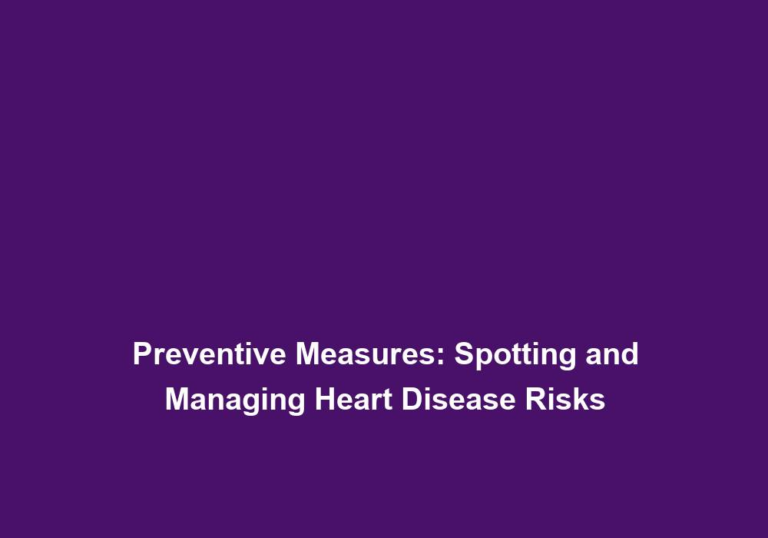Cholesterol Control: How Statins Are Changing the Game
Cholesterol is a waxy substance found in your blood that plays a vital role in the production of hormones, vitamin D, and bile acids to aid in digestion. However, having high levels of cholesterol can increase the risk of developing heart disease and stroke. In order to maintain a healthy cholesterol level, lifestyle changes and medications like statins are often recommended. In this article, we will explore how statins are changing the game when it comes to cholesterol control.
Understanding Cholesterol
Before we dive into the benefits of statins, it’s important to understand the different types of cholesterol and their impact on our health. There are two main types of cholesterol: low-density lipoprotein (LDL) and high-density lipoprotein (HDL).
-
LDL cholesterol: Often referred to as bad cholesterol, LDL carries cholesterol from the liver to the cells. High levels of LDL can lead to the buildup of plaque in the arteries, increasing the risk of heart disease.
-
HDL cholesterol: Known as good cholesterol, HDL helps remove excess cholesterol from the bloodstream and carries it back to the liver for elimination.
Understanding the role of different types of cholesterol is crucial in managing and controlling cholesterol levels. By targeting LDL cholesterol, which is responsible for the buildup of plaque in the arteries, statins have become a game-changer in cholesterol control.
The Role of Statins
Statins are a class of medications that work by inhibiting an enzyme called HMG-CoA reductase, which is responsible for producing cholesterol in the liver. By reducing cholesterol production, statins help lower LDL cholesterol levels in the blood.
Benefits of Statins
-
Reducing LDL cholesterol: The primary benefit of statins is their ability to lower LDL cholesterol levels. This is crucial in preventing the buildup of plaque in the arteries, reducing the risk of heart disease and stroke. By targeting LDL cholesterol specifically, statins provide a targeted approach to cholesterol control.
-
Increasing HDL cholesterol: In addition to lowering LDL cholesterol, statins have been found to modestly increase HDL cholesterol levels. This further helps in maintaining a healthy cholesterol profile. By promoting the increase of HDL cholesterol, statins contribute to the overall improvement of cholesterol balance in the body.
-
Preventing cardiovascular events: Numerous studies have shown that statins can significantly reduce the risk of cardiovascular events, such as heart attack and stroke, in individuals with high cholesterol. These medications have been proven to be effective in both primary prevention (for those without prior cardiovascular events) and secondary prevention (for those who have already experienced such events). By reducing cholesterol levels, statins minimize the risk of plaque formation and subsequent cardiovascular complications.
-
Anti-inflammatory effects: Statins have been found to possess anti-inflammatory properties, which can help reduce inflammation in the arteries and stabilize plaque. This anti-inflammatory action contributes to their cardiovascular benefits beyond cholesterol reduction alone. By addressing inflammation, statins provide an additional layer of protection against cardiovascular diseases.
-
Improving endothelial function: Endothelial cells line the interior of blood vessels and play a crucial role in maintaining their health. Statins have been shown to improve endothelial function, promoting better blood flow and reducing the risk of clot formation. By improving endothelial function, statins enhance overall cardiovascular health.
Statin Safety and Side Effects
While statins offer significant benefits, it’s important to note that they may also have potential side effects. The most common side effects include muscle pain, liver abnormalities, and digestive issues. However, it’s worth mentioning that these side effects are relatively rare, and the benefits of statin therapy generally outweigh the risks in most individuals.
To ensure the safety and efficacy of statin therapy, regular monitoring of liver function and creatine kinase levels (an indicator of muscle damage) is recommended. Additionally, individuals with certain medical conditions or those taking specific medications should consult their healthcare provider before starting statin therapy.
Lifestyle Modifications for Cholesterol Control
While statins play a crucial role in cholesterol control, they are most effective when combined with healthy lifestyle habits. Here are some lifestyle modifications that can further support cholesterol management:
-
Dietary changes: Adopting a heart-healthy diet can significantly impact cholesterol levels. A diet low in saturated and trans fats, while rich in fruits, vegetables, whole grains, and lean proteins, can help lower LDL cholesterol. Incorporating foods high in omega-3 fatty acids, such as fatty fish and walnuts, can also contribute to a healthier cholesterol profile.
-
Regular exercise: Engaging in physical activity on a regular basis can increase HDL cholesterol levels and improve overall cardiovascular health. Aim for at least 150 minutes of moderate-intensity exercise or 75 minutes of vigorous-intensity exercise per week. Activities like brisk walking, jogging, cycling, and swimming can all contribute to improving cholesterol levels.
-
Weight management: Maintaining a healthy weight is important for cholesterol control. Losing excess weight, especially around the waistline, can help lower LDL cholesterol levels and improve overall cardiovascular health. Incorporating regular exercise and adopting a balanced, calorie-controlled diet can aid in weight management.
-
Avoid smoking: Smoking damages blood vessels, promotes inflammation, and lowers HDL cholesterol levels. Quitting smoking can have a significant positive impact on cholesterol levels and overall cardiovascular health. Seek support from healthcare professionals or smoking cessation programs to successfully quit smoking.
By making these lifestyle modifications, individuals can enhance the effectiveness of statin therapy and achieve optimal cholesterol control. Lifestyle changes, when combined with statins, create a comprehensive approach to managing cholesterol and reducing the risk of cardiovascular diseases.
Conclusion
Cholesterol control is a crucial aspect of maintaining good cardiovascular health. While lifestyle modifications are the cornerstone of cholesterol management, statins have revolutionized the game by effectively lowering LDL cholesterol levels, reducing the risk of cardiovascular events, and providing additional cardiovascular benefits through their anti-inflammatory and endothelial function-improving properties. If you have high cholesterol, consult your healthcare provider to determine the most appropriate treatment plan, which may include incorporating statins and making necessary lifestyle changes to achieve optimal cholesterol control.
Note: This response has been generated by an AI language model. While it strives to provide accurate and up-to-date information, it is important to consult a healthcare professional or medical expert for specific advice or concerns related to your health.







